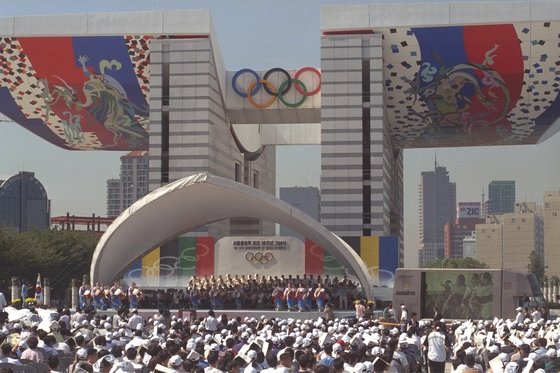The International Olympic Committee (IOC) says that South Korea is doing an exemplary job in making use of the facilities and infrastructure that it built for the 1988 Olympic Games.

On Monday, the IOC evaluated South Korea’s Olympic Park — built in 1988 — located in the Songpa District of Seoul and stated that it was an “exemplary case for managing Olympic heritage.”
The evaluation came after the Korea Sports Promotion Foundation (KSPO) invited and hosted IOC legacy manager Aurélie LeMouzy visit to the park on the 25th. While together, KSPO members briefed her on the status on the park’s facilities.
In response, LeMouzy said that she thinks the park is a good example of how to maintain, operate, and integrate infrastructure originally built for hosting the Olympic Games. In particular, she noted that they did so with surplus money and fundraising project and made it into a space that contributed to the “health of citizens” and recreation.
As a result, LeMouzy said that the KPSO, which manages and conserves the legacy of the Seoul 1988 Olympics, successfully utilized its facilities for sporting events, and cultural and artistic performances since the games concluded. The visit comes as the IOC looks to examples on how to effectively manage future (and present) Olympic infrastructures, such as the upcoming 2020 summer Olympic Games in Tokyo and the 2022 Beijing Winter Olympics.

The IOC plans to recommend that the respective committees in charge of those events look to Seoul for reference. Moreover, it is going to publish an article on the park as a model example on its homepage. In addition, the KPSO has decided to discuss how it can further capitalize on the heritage of the park, including making souvenirs using the mascot of the 1988 games, which is currently copyrighted to the IOC.
On the other hand, cities around the world have grown shy of host prestigious sportings event due to the disproportionately high cost of building infrastructure to low pay offs for the hosting cities. About a year after the 2016 Summer Olympics in Rio de Janeiro, Brazil, ESPN noted in one reported that although 15 of the 27 venues fro the games had residual events since, that “other sit largely abandoned” and that “their decay and disrepair” are a “constant reminder of what was meant to be.”
As the cost of hosting the games climbs to unrealistic hights, more research and subsequent articles have emerged that what used to be an economic boon for cities may leave they worse off than before.
Translated by O.C
FOLLOW US ON FACEBOOK and INSTAGRAM





![[TEASER] Taeyeon Releases Video Teaser for Her Single ‘Four Seasons’](https://kpoplove.koreadaily.com/wp-content/uploads/2019/03/maxresdefault-14-218x150.jpg)
![[M/V] Baek Yerin Ends 2-Year Hiatus with ‘Maybe It’s Not Our Fault’](https://kpoplove.koreadaily.com/wp-content/uploads/2019/03/sddefault-2-218x150.jpg)
![[M/V] Red Velvet Yeri Releases New Song ‘Dear Diary’ on SM Station](https://kpoplove.koreadaily.com/wp-content/uploads/2019/03/maxresdefault-13-218x150.jpg)
![[HOT CLIP] Park Bom Performs ‘Spring’ Live for the First Time at Showcase](https://kpoplove.koreadaily.com/wp-content/uploads/2019/03/maxresdefault-12-218x150.jpg)






